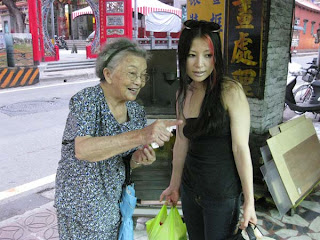Sunday August 10, 2008
Huiling at the Taipei Women's Rescue Foundation(TWRF) took me to Hsiu-mei Wu, Hakaness ahma's home in Taipei. The *ahma lived alone in an apartment. The ahma was very social, talkative and easy-going. We spent all day with the ahma.
She showed me her beautiful handmade bras which had been worn for over 20 years. She handwashed them and kept them so neat and white so, they looked almost new. These bras looked more like tank tops. The ahma said she liked them because she could keep her money inside the pocket of the bra when she went to market.
Also, she showed me a piece of burned wine bottle cork that she used to use for eyeliner many years ago. She demonstrated how she used it by burning the top of the cork with a match, then flattening the other end of the wooden match stick and using it as an applicator. Now, she said, it is much easier just to use an eye liner pencil.
About Hsiu-mei Ahma:
“I was deceived by the Japanese soldiers and became a military comfort women in 1940. Before we boarded the warship at Kaohsiung Harbor, the Japanese military doctor ordered us to undress for physical checkup. There were ten or more young girls on that shipment. None dared to defy the order. We kept trembling and followed the order. It happened over sixty years ago, but it is still vivid in my mind... As we got the ship, people told me that place was called Canton. It was a battlefield, the sound of cannons everywhere, full of Japanese soldiers at the harbor. Masses of Japanese soldiers were shouting “Wan-sui! Wan-sui!” (“Long Live!”)
Later, I was taken to a building to a building over ten-story high. I’ve never seen this kind of building before. The elevator was out of order and there was no electricity. There were many rooms, all totally dark. One person to one room. It was always foggy outside the window.
There were many soldiers. No matter how much I feared, I was assaulted by twenty or thirty Japanese soldiers daily. I was in so much pain I’d rather die. Whenever I didn’t go along or when they were drunk, they drew their samurai sward and threatened me. They said they were patriotic soldiers and should be well served.”
From “Compassion Without Borders” by The Taipei Women’s Rescue Foundation.
* "halmunis" in Korean, or "ahmas" in Taiwanese means "grandmas". (In Asia, elders are commonly referred to as grandmother or grandfather, whether you are related to them or not, as a way of showing respect.)

The ahma showing us her beautiful handmade bras
The ahma demonstration how she used to use a piece of charcol as an eyeliner



















































